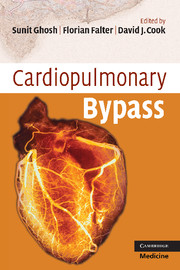Book contents
- Cardiopulmonary Bypass
- Cardiopulmonary Bypass
- Copyright page
- Contents
- Contributors
- Preface
- Chapter 1 Equipment and monitoring
- Chapter 2 Circuit setup and safety checks
- Chapter 3 Priming solutions for cardiopulmonary bypass circuits
- Chapter 4 Anticoagulation, coagulopathies, blood transfusion and conservation
- Chapter 5 Conduct of cardiopulmonary bypass
- Chapter 6 Metabolic management during cardiopulmonary bypass
- Chapter 7 Myocardial protection and cardioplegia
- Chapter 8 Weaning from cardiopulmonary bypass
- Chapter 9 Mechanical circulatory support
- Chapter 10 Deep hypothermic circulatory arrest
- Chapter 11 Organ damage during cardiopulmonary bypass
- Chapter 12 Cerebral morbidity in adult cardiac surgery
- Chapter 13 Acute kidney injury (AKI)
- Chapter 14 Extracorporeal membrane oxygenation
- Chapter 15 Cardiopulmonary bypass in non-cardiac procedures
- Index
Chapter 6 - Metabolic management during cardiopulmonary bypass
Published online by Cambridge University Press: 15 December 2009
- Cardiopulmonary Bypass
- Cardiopulmonary Bypass
- Copyright page
- Contents
- Contributors
- Preface
- Chapter 1 Equipment and monitoring
- Chapter 2 Circuit setup and safety checks
- Chapter 3 Priming solutions for cardiopulmonary bypass circuits
- Chapter 4 Anticoagulation, coagulopathies, blood transfusion and conservation
- Chapter 5 Conduct of cardiopulmonary bypass
- Chapter 6 Metabolic management during cardiopulmonary bypass
- Chapter 7 Myocardial protection and cardioplegia
- Chapter 8 Weaning from cardiopulmonary bypass
- Chapter 9 Mechanical circulatory support
- Chapter 10 Deep hypothermic circulatory arrest
- Chapter 11 Organ damage during cardiopulmonary bypass
- Chapter 12 Cerebral morbidity in adult cardiac surgery
- Chapter 13 Acute kidney injury (AKI)
- Chapter 14 Extracorporeal membrane oxygenation
- Chapter 15 Cardiopulmonary bypass in non-cardiac procedures
- Index
Summary
- Type
- Chapter
- Information
- Cardiopulmonary Bypass , pp. 70 - 79Publisher: Cambridge University PressPrint publication year: 2009

